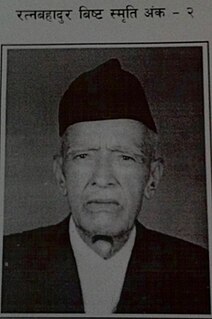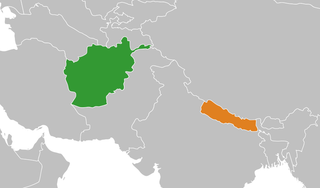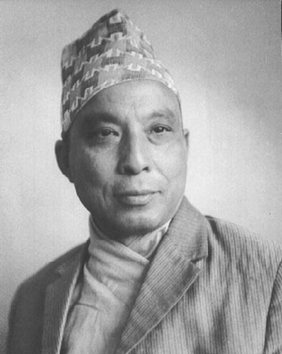
Biratnagar is a metropolitan city in Nepal,which serves as the capital of Province No. 1. With a population of 242,548 as per the 2011 census,it is the largest city in the province and also the headquarters of Morang district. As per the preliminary report of 2021 Nepal census,Biratnagar has an estimated city population of 244,750. It is one of the cities of the Greater Birat Development Area which incorporates the cities of Biratnagar-Itahari-Gothgau-Biratchowk-Dharan primarily located on the Koshi Highway in Eastern Nepal,with an estimated total urban agglomerated population of 804,300 people living in 159,332 households. Biratnagar is located 399 km (248 mi) east of the capital,Kathmandu,and 6 km (3.7 mi) north of the bordering town of Jogbani in the Indian state of Bihar. The highest peak in the world,Mount Everest,is situated 174 km (108 mi) north of the city.

The prime minister of Nepal is the head of government of Nepal. The prime minister is the head of the Council of Ministers of Nepal and the chief adviser to the President of Nepal.

Gaighat is an administrative centre within Triyuga Municipality and the headquarter of Udayapur District located in Province No. 1 of Nepal. Gaighat is divided into 2 wards called Gaighat Bazar and Old Gaighat. The Gaighat is located in Ward No. 11 and Old Gaighat is in Ward No. 12 of Triyuga Municipality. Total area of two wards is 16.11 square kilometres (6.22 sq mi) and total population is 14,243 with 2832 households.
Pushpa Lal Shrestha was a Nepali politician,considered to be the father of Nepali communism. He was the founding general secretary of the Communist Party of Nepal as well as leader.

Dr. Ram Baran Yadav is a Nepali politician and physician who served as the first president of Nepal from 23 July 2008 to 29 October 2015,following the declaration of a republic in 2008. Previously he served as Minister of Health from 1999 to 2001 and general secretary of the Nepali Congress.

Ministry of Finance is the central authority of Government of Nepal charged with the responsibilities for maintaining both micro and macro economic stability in the country. The position of finance minister in Nepal is currently held by Janardan Sharma,appointed on 13 July 2021.

Bam Bahadur Kunwar Rana was the 9th Prime Minister of the government of Nepal. He was brother of Jung Bahadur Rana.
Narayan Prasad Rajbhandari,professionally known ad Chittaranjan Nepali is a Nepalese writer and historian. He is the recipient of the first ever Madan Puraskar for his book Janaral Bhimsen Thapa Ra Tatkalin Nepal based on the life of prime minister Bhimsen Thapa. He writes in Nepali as well as Nepalbhasa.

The Chief of Army Staff (COAS),informally known as Chief Sa'ab,is the commander and highest-ranking officer of the Nepalese Armed Forces.
Cholendra Shumsher JBR is a Nepali jurist. He is the 29th Chief Justice of the Supreme Court of Nepal. He has been appointed by President on the recommendation of Constitutional Council of Nepal and oathed by Bidhya Devi Bhandari,President of Nepal on 2 January 2019.

Communism in Nepal traces its roots back to the pro-democracy movement of 1951,and the subsequent overthrow of the autocratic Rana regime and the establishment of democracy in Nepal. The communist movement in Nepal has split into factions multiple times and multiple factions have come together into a single fold at times as well. It has a history of getting banned from open political discourse,as well as multiple instances of embracing guerrilla insurgency,most notably,the Maoist insurgency in the 1990s and early 2000s that led to the Nepalese Civil War,claiming at least 17,000 lives.
Om Bhakta Shrestha was a Nepalese judge who served as 11th Chief Justice of Nepal,in office from 12 September 1997 to 12 April 1998. He was appointed by the then-king of Nepal,Birendra.

Surendra Prasad Singh was a Nepalese judge who served as 9th Chief Justice of Nepal,in office from 26 September 1995 to 14 February 1997. He was appointed by the then-king of Nepal,Birendra.
Nayan Bahadur Khatri was a Nepalese judge who served as 6th Chief Justice of Nepal,in office from 8 December 1976 to 10 December 1985. He was appointed by the then-king of Nepal,Birendra. He was the longest serving Chief Justice of Nepal.

Sir Ratna Bahadur Bista was the fifth Chief Justice of Nepal. He was born in Dadeldhura to an aristocratic family that was given land grants in Sudurpashchim Province circa 1911 during a hunting trip by King George V of the United Kingdom and Chandra Shumsher Jang Bahadur Rana,the Prime Minister of the Rana Dynasty. He went on to become the 5th Chief Justice of Nepal,in office from 26 July 1970 to 6 August 1976. He was appointed by the then-king of Nepal,Mahendra. He was responsible for the Summary Procedure Act 1971. The Committee that he established recommended for the establishment of High Courts in different regions which resulted in the creation of a four tiered judicial structure with one additional tier in the middle- "the Regional Courts."
KC is a surname anglicized as an abbreviation of Khatri Chhetri. The surname Khatri was historically legally labelled to the children of Brahmin fathers and Kshatriya (Chhetri) mothers after the introduction of Muluki Ain in 1854 by Jang Bahadur Rana of Nepal.
Yuddha Prasad Mishra(1964-2047 BS) was a progressive Nepali poet.

Afghanistan–Nepal relations refers to the diplomatic relations between Afghanistan and Nepal. Nepal has relations with the Islamic Republic of Afghanistan through its Embassy in New Delhi. The two countries have had long bilateral relations and both are members of the South Asian Association for Regional Cooperation (SAARC).

Bijaya Malla was a Nepalese poet,novelist and playwright. Malla wrote multiple novels,plays and poems in his lifetime. He is well known for his novels like Anuradha and plays like Koi Kina Barbaad Hos,Pattharko Katha and Dobhan.










